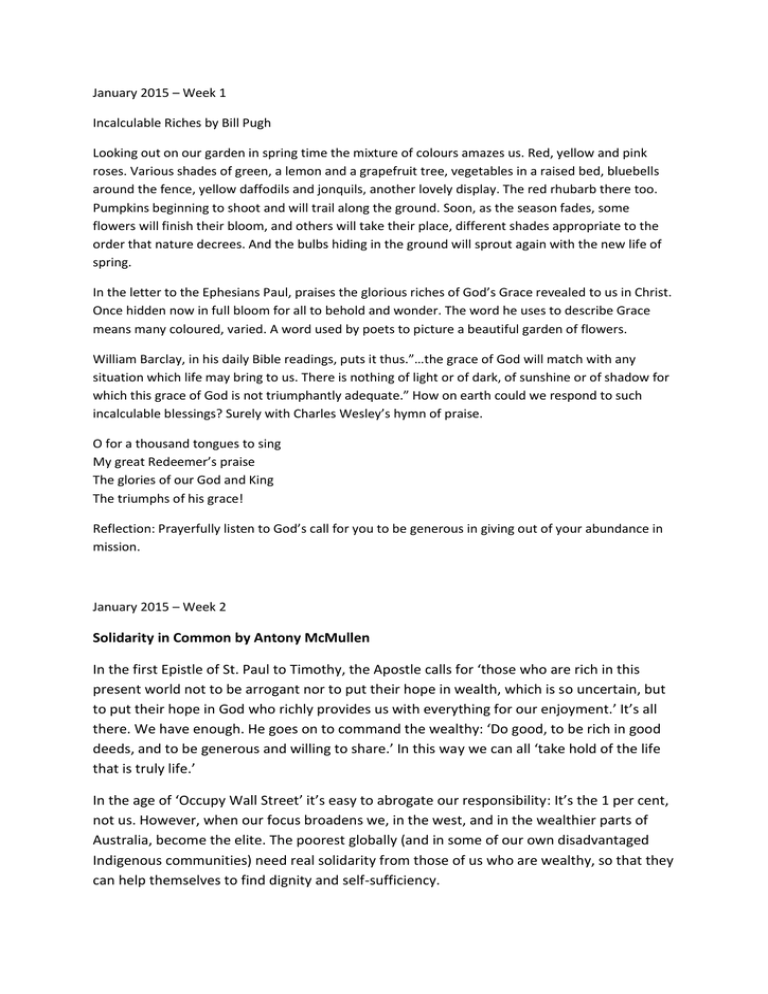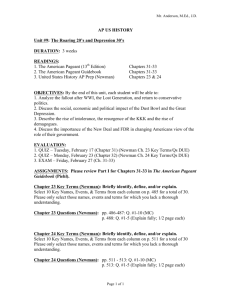Word format
advertisement

January 2015 – Week 1 Incalculable Riches by Bill Pugh Looking out on our garden in spring time the mixture of colours amazes us. Red, yellow and pink roses. Various shades of green, a lemon and a grapefruit tree, vegetables in a raised bed, bluebells around the fence, yellow daffodils and jonquils, another lovely display. The red rhubarb there too. Pumpkins beginning to shoot and will trail along the ground. Soon, as the season fades, some flowers will finish their bloom, and others will take their place, different shades appropriate to the order that nature decrees. And the bulbs hiding in the ground will sprout again with the new life of spring. In the letter to the Ephesians Paul, praises the glorious riches of God’s Grace revealed to us in Christ. Once hidden now in full bloom for all to behold and wonder. The word he uses to describe Grace means many coloured, varied. A word used by poets to picture a beautiful garden of flowers. William Barclay, in his daily Bible readings, puts it thus.”…the grace of God will match with any situation which life may bring to us. There is nothing of light or of dark, of sunshine or of shadow for which this grace of God is not triumphantly adequate.” How on earth could we respond to such incalculable blessings? Surely with Charles Wesley’s hymn of praise. O for a thousand tongues to sing My great Redeemer’s praise The glories of our God and King The triumphs of his grace! Reflection: Prayerfully listen to God’s call for you to be generous in giving out of your abundance in mission. January 2015 – Week 2 Solidarity in Common by Antony McMullen In the first Epistle of St. Paul to Timothy, the Apostle calls for ‘those who are rich in this present world not to be arrogant nor to put their hope in wealth, which is so uncertain, but to put their hope in God who richly provides us with everything for our enjoyment.’ It’s all there. We have enough. He goes on to command the wealthy: ‘Do good, to be rich in good deeds, and to be generous and willing to share.’ In this way we can all ‘take hold of the life that is truly life.’ In the age of ‘Occupy Wall Street’ it’s easy to abrogate our responsibility: It’s the 1 per cent, not us. However, when our focus broadens we, in the west, and in the wealthier parts of Australia, become the elite. The poorest globally (and in some of our own disadvantaged Indigenous communities) need real solidarity from those of us who are wealthy, so that they can help themselves to find dignity and self-sufficiency. Part of the solution is to find ways to share – like the Apostles in Acts who led the Christian community to share goods in common for the common good. Yes, we need to redistribute via tax and benefits (locally and even globally) – but we also need to remember to find ways to share goods and opportunities firstly amongst each other. It’s important to be humble and watchful for personal opportunities to be generous in spirit and action. As St. James says in his general Epistle, ‘religion that God our Father accepts as pure and faultless is this: to look after orphans and widows in their distress and to keep oneself from being polluted by the world.’ Reflection: Christians should prioritise those with the least. Living generously is ‘life, truly life’; it’s not the way of the world. Where we share, our generosity benefits not only those in need, but all of us. We are in this together. January 2015 – Week 3 The little things by Carly Green I often think about the greedy side of human nature when I’m on the bus travelling to and from work each day. When it comes to taking public transport an hour to work and home again, day in and day out, people can revert to their animalistic instincts. Because when you do it every day, little inconveniences become big deals. What is totally bearable for a one off – even for a ‘now and then’ – becomes intolerable with daily repetition. So, when someone gives up their seat – or squishes up to let you share a too-big-for-onenot-quite-big-enough-for-two seat with them – or politely allows you to get on first even if the bus looks dangerously full – you think to yourself ‘what a nice person’. It serves as one little reason to think well of humankind that day. This is in stark contrast to the people who, despite the fact you’ve been waiting at the bus stop for a while, when the bus pulls up will just walk right in front of you and get on as if you weren’t even there – often taking the last remaining seat. Or, if you’re short and you don’t get a seat, there are only a few places you can comfortably stand because the handles hanging from the roof are too high. Sometimes when this happens, a taller person will offer to swap places – other times, people just avoid eye contact. I really appreciate small acts of generosity when I’m on the bus. Those little things altogether make a big difference to how I feel. Reflection: Never underestimate the power of small gestures of kindness. A seemingly inconsequential interaction can make or break someone else’s day – don’t be the ‘last straw’ for someone; instead, be their excuse to smile. January 2015 – Week 4 Using what you’ve got for good – by a Synod Member The late Paul Newman was a famous American actor who starred in many blockbuster films, earning himself several awards and accolades during his long career. While this is impressive, it’s the philanthropic things he did with his fame and fortune that is particularly inspiring. During his life, Newman: - Founded Newman’s Own, a line of food and drink products (available around the world) with the policy that all proceeds, after taxes, are donated to charity. As of 2010 the franchise has donated in excess of $300 million; - Donated a quarter of a million dollars to Catholic Relief Services to aid refugees in Kosovo; - Donated $10 million towards college scholarships in the US; - Established a summer camp for seriously ill children – there are now several of the camps across several continents that service thousands of sick children every year at no charge; - Co-founded the Committee Encouraging Corporate Philanthropy (CECP) – an organization of CEOs and chairpersons devoted to increasing the amount and effectiveness of global corporate philanthropy. Newman passed away in 2008 at the age of 83. Inspiringly, his charitable work lives on. Reflection: Making your own unique contribution in whatever way you can is just as important as the contributions made by people like Newman. You may not have money to burn, a flair for entrepreneurship and a famous name to exploit – but you might have avenues for giving that are yet to be explored.




